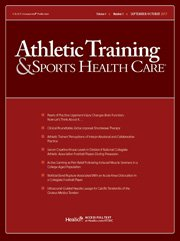Purpose: To evaluate the effect of exertional fatigue on the scores of two ocular motor tests: the King-Devick (Mayo Clinic, Oakbrook Terrace, IL) and near point of convergence tests.
Methods: Twenty physically active individuals participated in two sessions (control and fatigue) via a randomized crossover design. During the control session, outcome measures were assessed before and immediately following 20 minutes of rest. The experimental session outcome measures were assessed before and immediately following a 20-minute previously established physical activity fatigue protocol.
Results: Analysis of variance testing indicated no significant group × time interaction effect for near point of convergence (P = .864) and King-Devick (P = .155) testing.
Conclusions: The results of this study suggest that fatigue from physical activity does not affect near point of convergence or King-Devick test scores. Therefore, there is a low risk of a false positive concussion diagnosis due to fatigue during immediate sideline evaluation using these ocular motor assessments.
Summary Points:
- Immediate effects of fatigue as a result of an exercise protocol did not significantly affect King-Devick Test scores.
- This is concurrent with previous studies that examined the effect of fatigue on the King-Devick test after a basketball scrimmage, a basketball workout, or a short sprinting drill.
- In agreement with previous research, another finding was a mean improvement of 1 second that was noted during the experimental post King-Devick test measure exemplifying practice effects.
- Specificity in this study was 95% under conditions of acute fatigue.
- Sideline concussion evaluations are administered to athletes who are tired from playing their respective sport. Findings from this study demonstrate that, in a college-aged physically active population, the King-Devick test is unaffected by exertional fatigue and is an appropriate tool for assessing concussion under conditions of acute physical activity. Therefore, athletic trainers may perform these ocular motor assessments immediately after a suspected concussive event with low risk of a fatigue-induced false-positive result.

